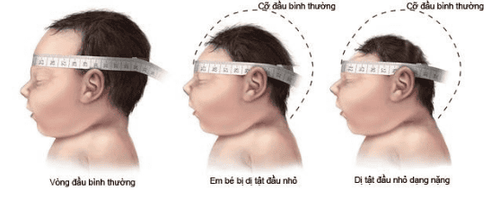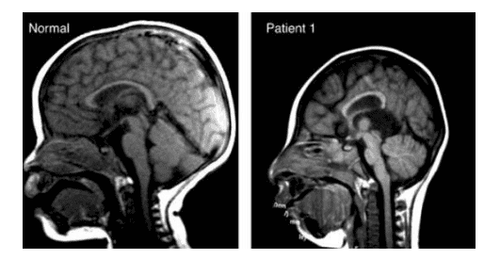This is an automatically translated article.
Posted by Specialist Doctor I Vo Ta Son - Doctor of Fetal Medicine - Department of Fetal Medicine - Vinmec Times City International Hospital
Microcephaly, also known as atrophy of the brain, is a very rare neurological disorder. Infants born with the misfortune of microcephaly will have a smaller head circumference than other children of the same age and sex. So what is microcephaly? What tests are needed to accurately diagnose this disease?
1. What is microcephaly?
The diagnosis of microcephaly refers to some babies having small heads when their head circumference is measured by ultrasound during pregnancy, or by a ruler wrapped around the head after birth. If the baby's head circumference is much smaller than the average head circumference for the age group or week of pregnancy, the doctor will diagnose the baby with microcephaly.
Normally, the measurement would have to be two standard deviations (2SD) below the mean, or less than 95% of fetuses or babies of the same age to be considered microcephaly. Ultrasound for microcephaly is best done at 28 weeks or in the third trimester of pregnancy.

2. How does microcephaly in the fetus happen?
There are several potential causes of microcephaly . The disease can be inherited if the father and/or mother are affected. In addition, chromosomal abnormalities such as Down syndrome can lead to microcephaly.
In addition, certain infections during pregnancy can lead to the baby having microcephaly such as cytomegalovirus (CMV) infections, rubella, HIV, toxoplasmosis, herpes, syphilis and most recently is the Zika virus. Maternal use of alcohol, drugs, or smoking during pregnancy or severe malnutrition can increase the risk of microcephaly in the fetus.
In particular, if during pregnancy, the mother is exposed to ionizing radiation or heavy metals such as mercury and arsenic will cause damage to the developing brain of the fetus or newborn, this cause also can lead to the onset of microcephaly.
MORE: Children with microcephaly, how to treat?
3. Pregnant women should do more tests to diagnose microcephaly in the fetus?
Additional tests will be ordered by the doctor if the pregnant woman is suspected of having an abnormality, and the fetus is suspected of having microcephaly. Other features observed on ultrasound detailing fetal anatomy may suggest a specific disease or syndrome. Magnetic resonance imaging (MRI) may be needed in certain situations to assist in determining the cause of microcephaly.
In cases where a chromosomal abnormality is suspected, genetic testing may be performed. If a viral infection is suspected, can maternal and fetal testing with blood draw, amniocentesis be done to help determine if the baby is infected?

4. What should pregnant women pay attention to during pregnancy?
In fact, the baby may have no other symptoms at birth other than a small head. Since microcephaly can be associated with certain medical conditions, it is important for the mother to monitor the fetus well throughout pregnancy to ensure adequate fetal development and to rule out abnormalities. often different anatomical structures. This monitoring can be achieved through regular antenatal visits and routine pregnancy ultrasounds to monitor fetal growth and other problems.
5. How does microcephaly affect the baby at birth?
Some children with microcephaly may not cause any symptoms other than microcephaly and having microcephaly is not necessarily predictive of a child's later functional outcome. However, others may trigger problems depending on the cause of microcephaly such as: mental retardation or learning difficulties, impaired vision and/or hearing problems , cerebral palsy, convulsions and hyperactivity.
Therefore, after giving birth to a baby with microcephaly, you will be referred to a pediatric neurologist. They can monitor a child's ongoing growth and development and devise a treatment plan tailored to individual needs. Although there is no specific treatment for microcephaly, early intervention with stimulation and play programs can be beneficial, as can treatment coordination with specialized medical staff (eg, microcephaly). eg, physical, occupational, or speech therapy, etc.).
6. Can microcephaly be re-occurred?
The chance of microcephaly recurring in subsequent pregnancies depends on what caused it. This percentage is variable and can range from 25% to 50% depending on whether only one or both parents are affected. If microcephaly is caused by a chromosomal abnormality such as Down syndrome, the added risk is only about 1% of the risk associated with maternal age. If microcephaly is caused by infection or exposure to other agents, the risk of recurrence in a subsequent pregnancy is very small.
Fetal microcephaly is a dangerous disease, often with a poor prognosis and is detected early from the 28th week of pregnancy. Accordingly, when the fetus has signs of microcephaly, the mother will need to do tests and perform diagnostic methods to find the cause of the disease. However, because microcephaly is a rare anomaly, pregnant women need to perform in-depth imaging with a doctor who has experience in diagnosing fetal malformations early.
Vinmec International General Hospital is famous as the place to gather many doctors with experience in ultrasound screening for fetal malformations and performing prenatal diagnostic and intervention procedures very early. In addition, Vinmec is also one of the very few hospitals equipped with the GE Voluson E10 high-end 4D ultrasound system, which accurately detects more than 95% of anomalies. In particular, in some cases where in-depth diagnosis is required to find out the cause, doctors at Vinmec will perform a combination of fetal magnetic resonance imaging with a 3.0 Tesla MRI scanner with a higher magnetic field that allows the machine to investigate. Fast, detailed 3D image reconstruction is of great significance in diagnosing brain abnormalities in microcephaly, helping couples make choices early in pregnancy.
Please dial HOTLINE for more information or register for an appointment HERE. Download MyVinmec app to make appointments faster and to manage your bookings easily.














